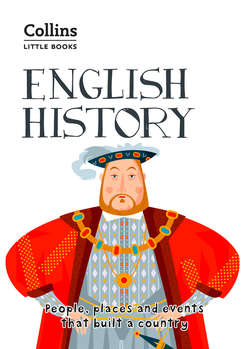Читать книгу English History: People, places and events that built a country - Robert Peal - Страница 5
ОглавлениеIntroduction
‘This royal throne of kings, this scepter’d isle… This precious stone set in the silver sea… This blessed plot, this earth, this realm, this England’
William Shakespeare, Richard II
In his paean to England in Shakespeare’s Richard II, John of Gaunt emphasises the importance of England’s status as an ‘island nation’. He is right to do so. So much of England’s history has been dictated by its position on a small, rainy island off the western coast of Europe.
England’s early history saw its shores invaded by waves of foreign settlers. The Romans arrived with Julius Caesar, followed by the Anglo-Saxons, the Vikings, and finally the Normans in 1066. This has given England an unusual mixture of Latin, French and Germanic influences. Days of the week in English are named after Norse Gods, but the months have Roman origins. The structure of the English language comes from Germany, but much of its vocabulary from France.
England’s status as an island nation has offered it unrivalled defences against foreign invaders, such as Phillip II of Spain in 1588, Napoleon Bonaparte in 1805, and Adolf Hitler in 1940. Unless you count the peaceful invasion of William and Mary in 1688, England has not been successfully invaded for one thousand years. The natural protection of the seas has given English history a stability and continuity that is unusual amongst the nations of Europe. The English Parliament has been meeting in Westminster since the 13th century, and the last battle fought on British soil was the defeat of Bonnie Prince Charlie at the Battle of Culloden in 1746.
England always depended upon its navy more than its army for protection, and for this reason the English people have long celebrated sailors as national heroes, such as Sir Francis Drake, Sir Walter Raleigh, Captain Cook and Lord Nelson. Britain’s seafaring tradition came into its own when the countries of Europe began building global empires. From the mid-18th century onwards, the Royal Navy lay behind Britain’s emergence as a world superpower, building an Empire stretching across North America, Africa, Asia and Australia. Today, Britain’s multi-racial society with large Caribbean, Pakistani, Bangladeshi, Chinese and Indian populations is a direct legacy of its time as a sea-faring Empire.
Any book on the history of England will encounter difficulty negotiating England’s appearance, and then disappearance, as a single political unit. England only emerged as one country, governed by one ruler, during the reign of Alfred the Great’s grandson, King Athelstan. If you were to pinpoint England’s birthdate, then King Athelstan’s victory against the Vikings at the Battle of Brunanburh in ad 937 is perhaps the best contender. For this reason, this book gives relatively brief treatment to the history of ‘England’ prior to 937, offering a brief outline of the prehistoric, Roman, and early Anglo-Saxon periods in order to set the scene for England’s emergence during the 10th century.
England’s status as a sovereign state ended in 1707, when the Act of Union fused England and Wales with Scotland to form a new nation: Great Britain. From this point onwards in the book, I cease to write so often of ‘England’, as so many actions – in particular the creation of a global Empire – were really carried out by Britain. However, even though England ceased to be a sovereign state in 1707, it remains a country, with distinct traditions, culture, and – perhaps most importantly! – international sports.
